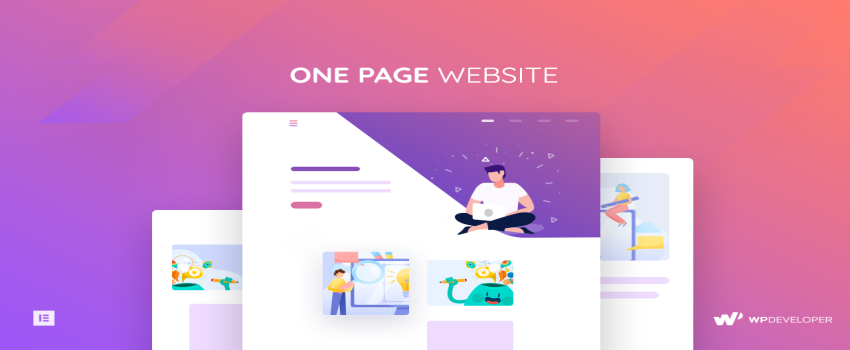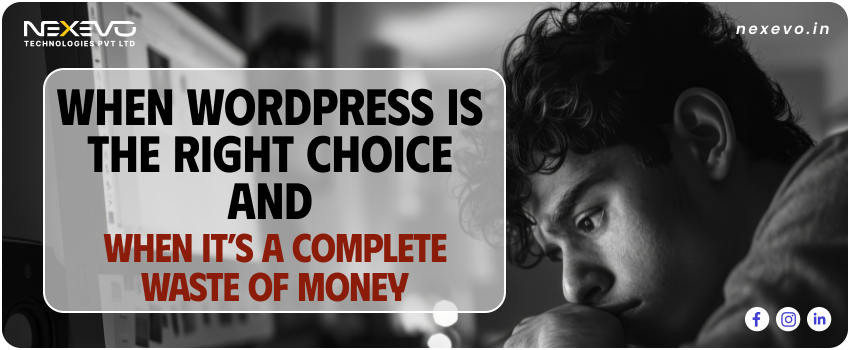Advantage and Disadvantage of a Single Page Website

Overview:
Welcome to our fun look at the good and bad sides of single page websites! Imagine surfing the web and coming across a single page website ideas – it's like finding a secret treasure! On one hand, these sites are super clean and easy to use, like speed dating for browsing! But on the other hand, squeezing all your stuff onto one page can feel like trying to pack a giant into a tiny car – it's a tight fit! Let's explore more about these single page websites and see if they're a hit or miss for you!
What is a Single Page Website?
Imagine a single-page website with innovative website ideas as a superhero of simplicity for your business. It's like a catchy tune that sticks in your head, but instead of music, it's all about your company. Everything your customers need to know is neatly laid out on one page, so they don't have to go clicking around. Plus, it's super friendly to use on mobile phones! Whether people are on their computers or phones, your website is there, looking good and ready to help them learn about your business. It's like having a tiny shop that's always open and easy to find online!
Single Page Website Examples:
- "The Handy Business Card": Imagine your business's very own digital calling card! A single page website does the trick, showing off your professional side of the website without the fuss of multiple pages.
- "The Smooth Scroller": It's like a digital slide of info—all in one easy scroll! No need to click around, just glide down and soak in all your business goodness.
- "The Mobile Magician": This website works its magic on any screen, making your business look top-notch on phones or computers. It's all about that professional touch, wherever you go.
- "The Highlight Hub": Show off your business's best bits! Each section shines a spotlight on what makes you great, all on a single page.
- "The Straightforward Guide": Say goodbye to web confusion! With a single page website, visitors get straight to the point—no maze of pages to navigate.
- "The Pocket-sized Pro": Small but mighty, this website packs a punch! It's like having a professional business website presence right in your pocket, ready to impress at a moment's notice.
Cost to Build Single Page Website
Thinking about building a single-page website for your business what will be the cost? Well, let's break it down. A single-page with best website ideas is like a neat little studio apartment online – compact and to the point. The cost in India varies. You can go budget-friendly, but expect basic features. Or, invest more in a quality website with better design and functionality. It's about finding that sweet spot between cost and quality. So, do some research, weigh your options, and make sure your online presence reflects your business in the best light possible. It's worth the investment!
Free Single Page Website Template:
- "ScrollEase": Get ready for a breeze in website creation with this free single page website template. It's like having a handy toolkit that lets you build a whole site on just one page. And guess what? It's free to download!
- "SoloScroll": Imagine surfing the web effortlessly with this single page website template free download. It's not just free, but also super easy to use. Plus, it's great for creating visually impaired websites, making accessibility a breeze.
- "OnePageWiz": Say goodbye to website headaches with this free single page website template. It's like having a magic wand for web design for your business, all in one neat package. And did we mention it's free to download?
- "SimplicityWeb": Dive into the world of easy website creation with this single page website template. It's your ticket to a stress-free design experience, and it won't cost you a dime thanks to being free to download.
- "AccessibleAvenue": Make your website inclusive with this single page website template, perfect website for visually impaired audiences. And the best part? It's completely free to download, making accessibility a priority without breaking the bank.
Visit for Free Templates for Single page Website development:
Advantages of One Page Website:
- Imagine a website that fits all its stuff on just one page! That's a single-page website template for you. No more endless clicking around - it's all right there in front of you!
- And guess what? It's super friendly to search engines like Google! Since everything's on one page, they can easily find and show off your site to people looking for what you offer. That's what we call an SEO-friendly website!
- Worried about safety? Don't be! With a single-page setup, there are fewer doors for troublemakers to sneak in. It's like having a super-strong lock on your digital front door.
- Navigation? Piece of cake! You won't get lost in a maze of links. It's like having a map with just one road - easy to follow!
- Best part? Updating is a breeze! Instead of fiddling with a whole bunch of pages, you just tweak one. It's like having a magic wand for secured website maintenance! Easy peasy.
Drawbacks of One Page Website:
- Having a single-page website with unique website ideas is like having a small snack instead of a full meal – you might miss out on the good stuff! Using a single-page website template can lower the overall quality of your site for business. It's like trying to fit a lot of things into a tiny space – it might look nice, but it's not very satisfying.
- Keeping up with website maintenance becomes a bit like playing a tricky game. Want to make a simple change? You might end up messing up the whole layout. It's like trying to fix one thing in a tangled mess of wires – not easy!
- Making sure your website gives the best user experience is important. But with a single-page site, it can feel like going on a confusing journey. Navigating through all that scrolling is like trying to find your way in a dark room – disorienting!
- Getting your website noticed by search engines can be tough with just one page. It's like trying to stand out in a big crowd with a tiny sign – not very likely!
- And don't forget about mobile users! Viewing a single-page site on a phone can be a bit like squinting at tiny print. It might look good on a computer, but on a phone, it's like trying to cram too many things into a small space – not very comfortable!
Who Can Choose One Page Website?
- If you're not a tech whiz but want a snazzy website, try a single-page website template. It's like having all your info on one neat page, no need to click around.
- Got a small biz? A single-page site keeps things simple for your visitors (so we get more traffic to the website), like driving on a clear road instead of getting lost in traffic.
- Whether your website is static or dynamic, a single-page setup works like a charm for both. It's like having a website that can do a bit of everything.
- Feeling lost on how to make one? Don't sweat it! There are tons of easy-to-follow guides online. With a little practice, you'll be a single-page website pro in no time.
- Who should go for a single-page site? Anyone with a story, a product, or just something cool to share. It's like having your own online billboard – simple, effective, and easy to manage.
To Wrap-up:
In the world of making websites, single page websites are like those cool surprises. They're simple, easy to use, and look great. But sometimes they can be a bit tricky. They might not have enough info, take a while to load, or make you scroll forever. But with the help of a software development company and a web development company in Bangalore, you can tackle these issues like a champ. So whether you love single pagers or not, one thing's clear - with the right team, you can handle anything the web throws your way.
FAQ'S:
1. How to Create a Single Page Website?
To create a single page website, you can use website builders like Wix or WordPress, or code it from scratch using HTML, CSS, and JavaScript.
2. How to Design a Single Page Website?
When designing a single page website, focus on clear navigation, concise content, impactful visuals, and ensuring a smooth scrolling experience for users.
3. How Much Does a Single Page Website Cost?
The cost of a single page website varies depending on factors like complexity, design, features, and whether you hire a professional developer or use a DIY platform.It may be several hundred or several thousand.
#webdevelopment #webdevelopmentcompany #webdevelopmentcompanyinbangalore #mobileappdevelopment #customsoftwaredevelopment #webappdevelopment











